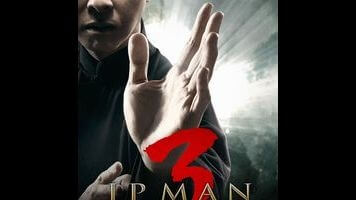Donnie Yen plays a kung fu grandmaster one more time in Ip Man 3

The recent glut of films about real-life Wing Chun Grandmaster Ip Man have nearly all made at least a passing reference to one of the most fascinating bits of Ip’s biography: that he once trained a young Bruce Lee, who then took what he learned in Hong Kong with him to America, where he started his own school. Director Wilson Yip and star Donnie Yen helped kick off the Ip Man craze with their 2008 film of the same name, and then in their 2010 sequel—which at the time was touted as the end of the story—they introduced Bruce Lee as a boy in the final scene. Yip and Yen ultimately agreed to go one more round, and in the opening scene of Ip Man 3 they bring back Lee, now an adult. But the third Ip Man isn’t Lee’s story, no matter how much some fans of Hong Kong martial arts cinema may have hoped it would be.
Except that, in a roundabout way, Ip Man 3 actually is about Bruce Lee… and Jackie Chan too, and Sammo Hung, and Jet Li, and Donnie Yen. Like all the other films in this series, the third installment is a celebration of the kind of discipline and creativity it takes to become a martial arts legend—be it historical or fictional. The movie’s a period piece, set in 1959, and mixes real facts about Ip’s life and 1950s Hong Kong with the kind of elaborate fight sequences that kung fu fans expect. Yip and his screenwriters have created a three-part biopic that shrugs off accuracy in order to explain who its subject really is, and what he means.
As it happens, the weakest part of Ip Man 3 is its run-of-the-mill, almost juvenile potboiler plot. The bulk of the movie has to do with Ip warring with the Triads, and navigating an underground fight club in order to keep a local martial arts school open. Meanwhile, as the hero is protecting crying kids from vicious gangsters—and fending off the bad guys’ armies of goons—he’s also helping his wife come to grips with her cancer diagnosis. And as a direct and indirect result of all of this, Ip’s developed an unintentional rivalry with another Wing Chun instructor, Cheung Tin-Chi (Zhang Jin), who thinks that Ip’s many distractions prove that his kung fu is inferior.
Aside from the cancer subplot, this is all pretty predictable, but only because the story’s primary purpose is to generate opportunities for Yen and Yip to do their thing. The two have been fruitful collaborators since 2005, when their SPL paid homage to the 1980s HK action heyday, so if nothing else, Ip Man 3 doesn’t lack for memorable set pieces. Yip and cinematographer Kenny Tse send their cameras swooping around the star as he stick-fights his way down a flight of stairs, evades attackers in the wooden frame of an under-construction ship, and kicks ass in the tight confines of an elevator. The bright idea of the first Ip Man was to use a real person’s life as the rough outline for a conventional martial arts adventure. That basic premise still has some juice left, given that it’s always a joy to watch Yen work.
Still, Ip Man 3’s real highlights are the scenes that have the least in common with its predecessors. Bruce Lee returns to the story briefly to teach Ip how to dance, so his master can take his dying wife out for a night on the town, and that whole sequence underscores how much kung fu choreography has in common with the graceful gliding in classic Hollywood musicals. And when Mike Tyson (yes, that Mike Tyson) shows up for a few minutes to play an underground fighter who challenges Ip to a bare-knuckle brawl, his presence is a reminder that sometimes what matters most about these films is that they document the moves and skill of some of the greatest martial artists of their time.
The last shot of Ip Man 3 is of a photograph, showing the grandmaster with his students, because one of the persistent messages of this series has always been that one man’s wisdom and good example can spread. But the picture—of Yen as Ip, not of Ip himself—also re-establishes another major point of the Ip Man franchise. The hero of these films was a real guy, who lived contemporaneously with some of Hong Kong cinema’s first international superstars. And the star of these movies is Donnie Yen, one of the genre’s best for the past two decades. The latter’s a real person too, and has been telling his own story with every smooth pivot and hard chop.